|
|
1882 matching reports found. Showing 81 - 100 [TamilNet, Sunday, 28 October 2012, 17:39 GMT]Unlike the Eastern Province, where Colombo has waged a successful campaign of divide-and-rule, creating and sustaining communal disharmony among the Tamil-speaking people, the people of Mannaar have managed to co-exist in the district against all odds in the past. Vanni knew it better. The solidarity went to the extent of coastal Muslims in Mannaar sustaining a lifeline to Vanni in transporting crucial energy supplies across Sri Lanka to the de-facto state of Tamil Eelam during the Eelam War III and IV. Now, as the balance of power is gone and the country of Eezham Tamils is under genocidal occupation, the agents of Colombo manoeuvre to divide Catholics and Muslims in Mannaar and thereby to create sectarianism among the Tamil-speaking people. The vacuum of a competent Tamil polity in the region has also been favourable to the SL state, writes a political observer in Mannaar. Full story >> [TamilNet, Friday, 19 October 2012, 16:09 GMT]Genocidal Sri Lanka’s presidential sibling Gotabhaya Rajapaksa on last Thursday called for the abolition of the New Delhi-architected 13th Amendment to the constitution without further delays, reported The Island, last Friday. Gotabhaya compared the Amendment to the 2002 Ceasefire Agreement (CFA) in facilitating separatism. Rejecting SL military pullout from the Tamil territories and upholding ‘majoritarian’ rule of the island, he also implied what course would be taken by the LLRC implementation legitimised by the USA at Geneva. Meanwhile, writing to The Island on Thursday, TNA’s nominated parliamentarian Mr Sumanthiran, asked what hope is there in TNA participating the Parliamentary Select Committee (PSC) of Rajapaksa regime to discuss solutions. Full story >> [TamilNet, Thursday, 11 October 2012, 18:26 GMT]After the International Community of Establishments working in tandem with a genocide-intending Sri Lankan state oversaw a brutal military solution over the armed struggle of the Eezham Tamils in May 2009, the ‘Sri Lanka model’ of dealing with insurgencies is now being incorporated into the science of Counterinsurgency (COIN), opines RM Karthick, observing what dangerous ramifications this could have for struggling peoples worldwide in an article published on Sanhati, an Indian online journal, on Wednesday. Outlining internal and external factors in shaping the conflict, using the politico-military analysis of the late TamilNet senior editor ‘Taraki’ Sivaram, the author explains how internationally coordinated measures against the LTTE and the genocidal intent of Sinhala nationalists led to Mu’l’livaaykkaal and the systemic repression of the Eezham Tamils in their homeland that followed. Full story >> [TamilNet, Tuesday, 02 October 2012, 23:21 GMT]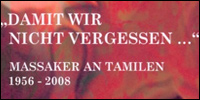 A compilation of large-scale massacres from 1956 to 2008, brought out by the North East Secretariat on Human Rights (NESoHR), has been translated to German. The book, “Damit wir nicht vergessen” will be launched at Frankfurt Book Fair this month. The publication has an important historical dimension as it presents the massacres prior to 2009 genocidal onslaught in a historical dimension, says Emeritus Professor Peter Schalk in Uppsala, Sweden, sending an introductory note to TamilNet. “In a shortened time perspective those violations of human rights [in 2009] may appears as an occasional and random deviation of a particular Government of Sri Lanka or as committed by individual offenders. We have good reasons to assume that this massacre by the government represents a planned cultural and physical genocide over a long time,” he further says adding that a Chinese translation is desirable. Full story >> [TamilNet, Wednesday, 29 August 2012, 23:03 GMT]Leftover unexploded cluster munitions keep exploding every day in the suburbs of PTK, where the resettling people have embarked upon the dangerous exercise of clearing their lands. In a propaganda drive to close down the Menik Farm camp in Cheddiku'lam, Vavuniyaa, Sri Lanka military operated de-mining officers have given green signal for resettlement in selected suburbs of Puthukkudiyiruppu (PTK) of Mullaiththeevu district, while the lands appropriated by the occupying SL military for militarization and Sinhalicisation in the same area have been carefully de-mined with external aid. At least four cases of big explosions have been reported in Vanni and Jaffna this week with two people seriously injured.
Full story >> [TamilNet, Monday, 20 August 2012, 21:55 GMT]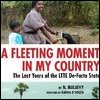 As a first hand written account of a diaspora Tamil who lived and worked for over four years in civilian institutions in the de facto state of the Eezham Tamils, N. Malathy’s “A fleeting moment in my country: The last years of the LTTE de-facto state” bears witness to how the sovereignty earned through the conduct of the struggle of the Eezham Tamils was denied by world powers, leading to the Mu’l’livaaykkaal massacre. A literature of ‘lived experience’ of one who stayed in Vanni for 4 years working with civilian institutions like NESoHR, women and child organizations, and later spending over 4 gruelling months in the Manik farm detention camps, the book should elicit interest not just from Tamils world over, but also academics, activists, feminists, journalists and those interested in studying social life under a political struggle against genocide. Full story >> [TamilNet, Sunday, 03 June 2012, 00:53 GMT]The war within the same people in the regime and opposition in Syria, casualty wise much less in proportion to the genocidal war in the island of Sri Lanka in 2009, has evoked active responses from all the powers and the UN that were never shown in the case of the massive genocide of Eezham Tamils. The genocidal ruler Rajapaksa and his regime are still pampered by the world establishments, from the diamond jubilee celebrating Her Majesty’s Government in the UK to Buddhism celebrating Thailand, and from the USA and India facilitating escape route in the UNHRC to China, Russia and Cuba steadily protecting the regime. Nelson’s Eye will not help the world order. But Tamils have to realise that the failure of Tamil Nadu in 2009 and the continued failure of global Tamils in addressing the real culprits cause the disparity, said a diaspora activist. Full story >> [TamilNet, Friday, 01 June 2012, 07:26 GMT] The international players knew what was going to happen in May 2009 to the Tamils but they did nothing to prevent it, and that was a shame right at the beginning of the 21st century, and a shame for the entire century, stated Mirham Yigit, Head of Kurdish Institute in Germany, in an interview to TamilNet. Talking about the current phase of the Kurdish nationalist movement, the role of the Kurdish diaspora, the importance of ideology in the struggle, the senior Kurdish activist said that when “illegal and militarist states” cooperate with one another, it was necessary for people oppressed by such states to build greater solidarity with each other. Full story >> [TamilNet, Thursday, 10 May 2012, 18:14 GMT]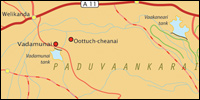 At least 90 families in Oottuch-cheanai, a village situated 75 km north-west of Batticaloa city, have been displaced and sought asylum in a school following a mini-cyclone that hit Paduvaankarai area in the Koa'ra'laip-pattu South division of Batticaloa district on Monday. The villagers, who have displaced several times since 1990, each time following large-scale military operation by the Sri Lankan military, have been completely neglected throughout the years without proper humanitarian assistance, civil sources in Batticaloa said. International NGOs also face restrictions to visit the area while Colombo government has grabbed around 25 thousand acres of land in Vadamunai and Oottuch-cheanai, handing over the lands to Sinhala home guards. Full story >> [TamilNet, Monday, 30 April 2012, 08:24 GMT]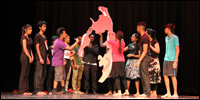 Utilizing various mediums, including drama, dances, spoken word, songs, and dialogue, second generation Tamil youth in Canada conveyed the message of preserving the Eezham Tamil identity, and continuing the freedom struggle of the Eezham Tamils, at I'lantha'lir - The Artistic Revolution of Tamil Eelam’. The event performed to a packed audience on Friday at The Chinese Cultural Centre in Toronto showcased the historical evolution of the Tamil Eelam Struggle. “An outstanding play with such amazing concept, acting, dances, songs, spoken word, screenplay, dialogue, setting and flow. Our struggles, our nation building capacity, our resilience, our cries, our milestones and our vision were communicated most effectively,” said Neethan Shan, President of the New Democratic Party of Ontario and the Guest of Honor at the event. Full story >> [TamilNet, Sunday, 15 April 2012, 23:15 GMT]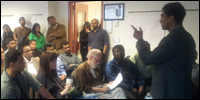 Speaking at a meeting on “The Tamil Struggle for Self-Determination: A Leftist Sinhala Perspective” at University of Toronto’s Ontario Institute of Studies in Education, Sinhala academic Dr. Jude Lal Fernando highlighted the need to understand the role of powers in shaping and manipulating the forces among the Sri Lankan state and the Eezham Tamils, on Thursday. Talking extensively about how the western establishments tilted the parity of status against the Tigers during the CFA period, he expressed the view that the US-UK axis was to blame for the 2009 massacre. Dr. Fernando, who was one of the main co-ordinators of the Dublin Permanent People’s Tribunal on Sri Lanka, explained how with the implementation of neoliberal policies the Sri Lankan state expedited privatization and militarization of the Tamil homeland. Full story >> [TamilNet, Wednesday, 14 March 2012, 02:48 GMT]"Hundreds of people languish in arbitrary, illegal and often incommunicado detention in Sri Lanka, vulnerable to torture and extrajudicial execution, despite the end of the country’s long conflict... arbitrary and illegal detention and enforced disappearances remain routine in Sri Lanka, where human rights abuses of all types go uninvestigated and unpunished," Amnesty International said in a new report "Locked away: Sri Lanka's security detainees," released Tuesday. Full story >> [TamilNet, Tuesday, 13 March 2012, 18:58 GMT]A coalition of 12 grassroot Eezham Tamil Diaspora organisations all over the world, on Tuesday, jointly urged the UN Human Rights Council (UNHRC) to compel Colombo to free all Tamils in detention, withdraw all of its armed forces from the Tamil homeland and report back on completion by the 20th session. The organisations, consisting of democratically elected country councils, all the country branches of the Tamil Youth Organisation (TYO) and Tamil Coordinating Committees (TCC) “deeply regretted” the decision of the United States to show regard for the Lessons Learnt and Reconciliation Commission (LLRC) and called upon the UN to initiate an “immediate independent international investigation into the genocide of Eelam Tamils in the island of Sri Lanka” and urged the apex body to conduct a referendum with a free and sovereign state of Tamil Eelam as “an explicit option”. Full story >> [TamilNet, Tuesday, 14 February 2012, 13:15 GMT]While the Australasian Federation of Tamil Association (AFTA) said it is disappointed to see Australia’s
response to LLRC "lacks either the persuasive language or open caution to Sri Lanka for its failure to address alleged violations of international humanitarian and human rights," Australian Tamil Congress (ATC) said it is "concerned that Mr Rudd has continued to call on Sri Lanka to investigate itself. The Tamil community has no confidence in the Government of Sri Lanka to conduct an independent investigation and deliver justice to the victims of the war. We cannot expect justice when an investigation is initiated by a party to the alleged crimes," ATC release said. Full story >> [TamilNet, Monday, 19 December 2011, 00:41 GMT]While structural genocide continues unabated in the homeland of the Eezham Tamils, certain well funded Sri Lankan NGO’s that harp on peace and reconciliation are steadily pursuing a war by other means on the Eezham Tamil Diaspora. Programmes initiated by organizations like the One Text Initiative, which receives generous funding from foreign donors as well as support from the Sri Lankan state, in the name of ‘engaging with the Sri Lankan diaspora’, are attempting to marginalize the Eezham Tamil diaspora polity that is pushing for international investigation into genocide committed by the Sri Lankan state as well as recognition of their political sovereignty. This agenda was evident from a recent meeting in London where such proponents of reconciliation were challenged by Eezham Tamil activists of various shades. Full story >> [TamilNet, Tuesday, 22 November 2011, 03:39 GMT] Norwegian minister Erik Solheim, while speaking in Oslo 11 November at the release of the report evaluating Norway’s failed peace process in Sri Lanka, tried to hijack the philosophical thrust of the findings of the report and this brought him into confrontation with the evaluation team leader, Gunnar M. Sørbø. Mr. Erik Solheim tried to defend the main criticism in the report and the stand of Sørbø that Norway should have quit the peace process to signal the world of the impending dangers. Arguing that nobody expected a military solution succeeding, Solheim painted the picture of a star-crossed and epic-style tragedy that everyone has to be now contended with in a philosophical way, and said that the stand of Sørbø was ‘arrogant’. Solheim’s speech made Sørbø to remind that the issue was of life and death and Norway should have had contingencies ready. Full story >> [TamilNet, Saturday, 12 November 2011, 21:12 GMT] Sri Lanka Monitoring Mission (SLMM), the peace keeping arm of the Norway facilitated peace process in the island, tilted the balance in favour of the Sri Lankan state and against the LTTE, wrote Gajendrakumar Ponnampalam in 2007, in an unpublished research paper on the 2002 Ceasefire Agreement (CFA) he submitted to a foundation in the West. The IC could have used the CFA to pursue conflict resolution by maintaining the balance of power between the parties, but to the contrary it had used the CFA as a ‘counterinsurgency’ tool to reinforce the state and weaken the de facto state, so that the state could pursue yet another military solution to the conflict, he further wrote. The unpublished paper that reveals how the very idea of Norway’s peace facilitation was to ‘fail the peace facilitation’ in favour of state, is documented here for historical purposes. Full story >> [TamilNet, Friday, 11 November 2011, 11:11 GMT]A report on Norway’s failed peace process in Sri Lanka, “Pawns of Peace: Evaluation of Norwegian Peace Efforts in Sri Lanka, 1997-2009” was released in Oslo on Friday. Whether pawns of peace or ploys for genocide, Norway’s report distributed blame among all the actors. A deficiency the report finds in Norway was not its grave failure to warn the world about peace turning into genocide, but that Norway should have escaped from the scene at an earlier stage. The report admits that the peace process has only enhanced obstacles to peace now. But, even after the process facilitating internationally abetted genocide, the report subconsciously sees “victory” in the war and it now harps on “primacy of domestic politics,” to imply ways for solutions. Norway washes hands of its responsibilities to victims and the report now seeks lessons to learn for ’peacebuilding’ elsewhere. Full story >> [TamilNet, Thursday, 22 September 2011, 03:55 GMT]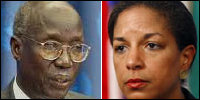 In March 2009 Sri Lanka had come to the attention of the UN’s Special Adviser for the Prevention of Genocide, Francis Deng, but despite his disquiet he did not take further steps as Sri Lanka had assured him the United States and India supported its military campaign, according to a leaked US cable. The account of the meeting on March 16, 2009 between Mr. Deng and the US Ambassador to the UN, Susan Rice, as well as other US cables, shows how international inaction and silence, rather than ignorance, made it possible for Sri Lanka to continue and escalate its mass killings of Tamil civilians. Full story >> [TamilNet, Friday, 16 September 2011, 21:43 GMT]During the final days of the genocidal war in Vanni when the international community was repeatedly urging Colombo to cease attacks on the ‘safe zone’, the SL President and Commander-in-Chief of the SL armed forces Mahinda Rajapaksa admitted to a top US envoy that his military had deployed Long Range Reconnaissance Patrol (LRRP) missions, also known as Deep Penetration Units (DPU) inside the so-called safe-zone to “organize people to breach the LTTE earth bunds.” Mr. Mahinda Rajapaksa has ‘confidentially’ shared this military secret to Charge d'Affaires of the US embassy James R. Moore, while holding a meeting with Co-Chair Ambassadors in Colombo, barely two week before Colombo massacred thousands of civilians and claimed military victory over the Liberation Tigers of Tamil Eelam. Full story >>
|
|















